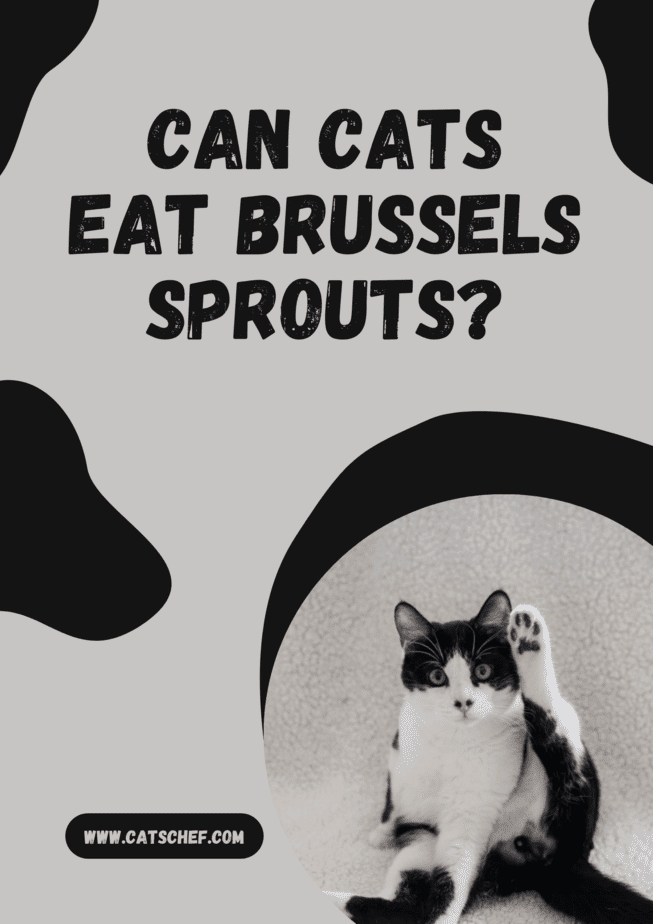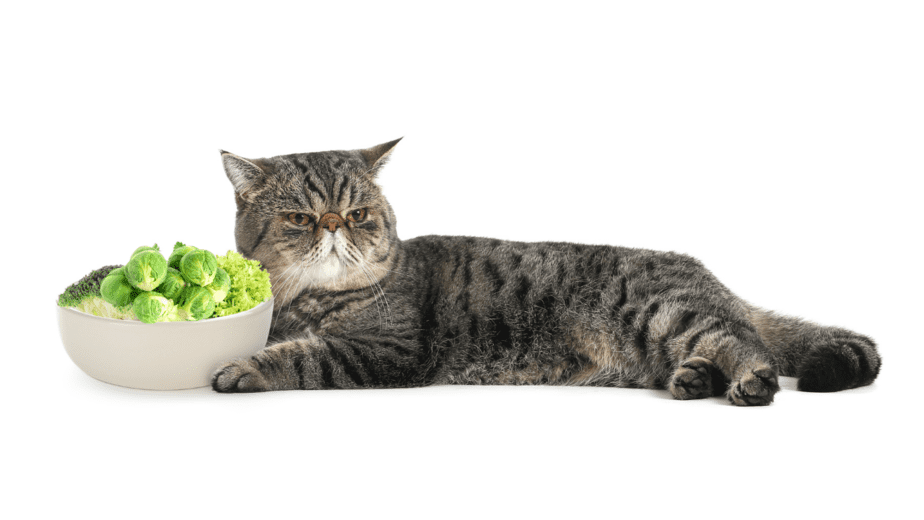Veggies aren’t what comes to mind when you think of cats, right? Surprisingly, they can eat a range of greens without any problems. Can cats eat Brussels sprouts, though? Will they love these small, green crucifers?
It’s hard to tell because cats are known to be finicky eaters as well. We know they are obligate carnivores, which means they depend on meat for survival. Therefore, veggies aren’t their main choice of diet. Think about it – you don’t see a wild cat munching down on some Brussels sprouts.
That said, you may have an oddball who awaits the opportunity to steal something from your plate. You think you’ve given her everything but yet, here she is, surprising you all the time!
We tend to fulfill all of our furkids’ wishes, but their safety and well-being must be our priority.
Can cats eat Brussels sprouts safely?
We know veggies are healthy and we try to incorporate them into our daily meals as much as possible. But are we right to do it to our pet’s meal plan? She may be mad when she sees all the greens you’ve put in her bowl!
Jokes aside, you’re here because you’re wondering if cats can eat Brussels sprouts. Well, the answer is yes, they can.
Brussels sprouts are not just okay for humans to eat, but for their furry companions as well. Not so sure about whether they are crazy about them though.
Brussels sprouts are small, round, and generally fun little veggies. Your cat may appreciate it more as a form of entertainment due to its ball shape. Now we know you don’t play with your food, but we also know your cat is the boss of the house!
Do cats even like Brussels sprouts?
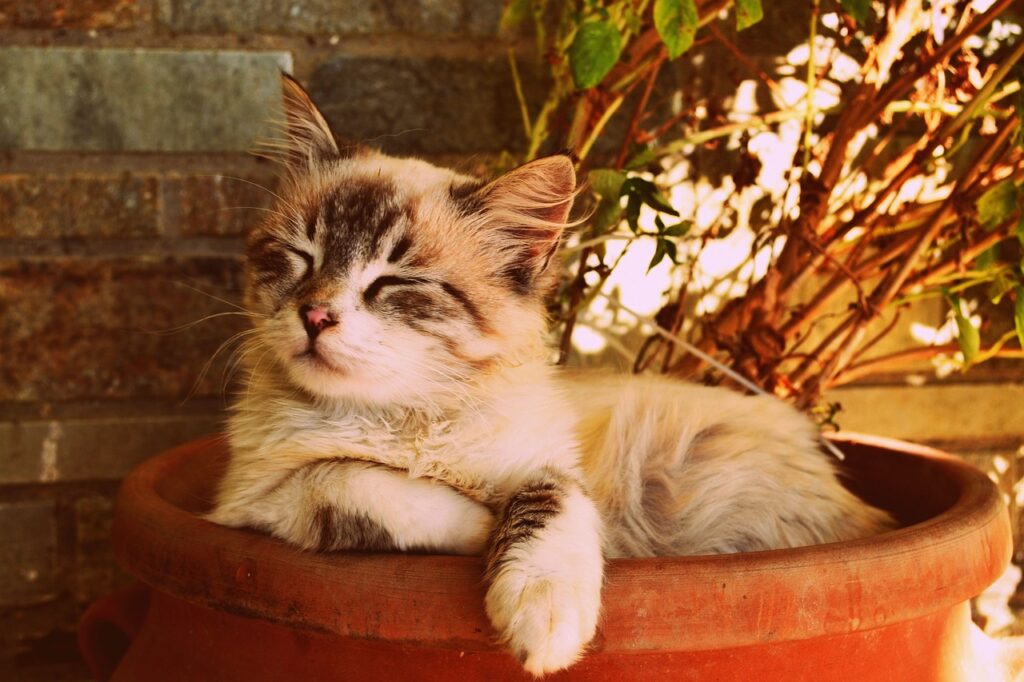
It’s hard to say if your pet will be keen on trying out these new greens. Cats are curious creatures by nature so she might want to investigate a bit. If you want to incorporate Brussels sprouts into her diet, make sure to introduce them slowly.
As much as they’re the devil sometimes, cats are sensitive and the smallest change could have a strong effect on them. Felines rely heavily on their sense of smell which is important for orientation, communication, and food foraging.
Certain smells will definitely entice them, like that of beef jerky, for example. However, even though cats can eat Brussels sprouts, maybe they’ll have to give it a second thought. After all, this cruciferous veggie doesn’t really smell anything like meat.
Although they’re curious, they’re also smart and cautious animals. If you ever wanted to trick your pet into eating pills, you know she’s bound to outsmart you in no time. So why would it be different with new foods?
Health benefits of Brussels sprouts
This cabbage-like vegetable may not be a winner in looks or tastes, but it’s one of the healthy champions. We’re not saying it holds the title for the world’s most healthy veggie, but it is jam-packed with the good stuff.
It’s nice knowing something you share with your furkid is going to help her out, right? Brussels sprouts are loaded with vitamins, minerals, fiber, as well as protein.
It’s safe to say that not only can your cat eat Brussels sprouts, but they may be one of the best greens for her out there! They’re abundant in health supplements that are required for growth.
1. Vitamins and minerals
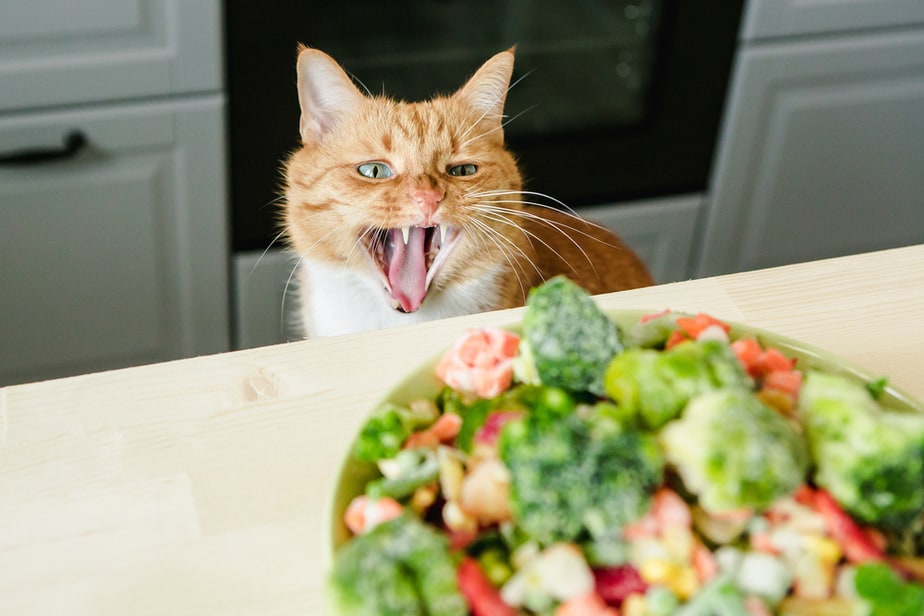
The high amount of vitamins and minerals found in Brussels sprouts make up for the lack of an attractive aroma. Health supplements are more important than what the food smells like and Brussels sprouts are a perfect example of that.
These veggies are packed with vitamin C. Felines synthesize this vitamin in their liver, but an additional amount could come in handy.
Vitamin C helps in many bodily functions, such as making collagen. Collagen is a protein important for the formation of bones and cartilage. That said, animal-derived proteins, like those found in chicken feet, are a better source for felines.
Next to that, vitamin C works as an immune booster and has an important role in helping with iron absorption. Speaking of iron, it’s a crucial mineral also found in Brussels sprouts.
Iron helps make red blood cells that carry oxygen throughout the body. Thanks to this mineral, your cat stays focused and energetic.
Brussels sprouts are also high in B vitamins that are building blocks in your pet’s body. They help with many body functions such as metabolism and the creation of red blood cells. These are also the reason your cat’s skin is so healthy and elastic.
And if you ever wonder why your feline seems so strong and has defined muscles, magnesium is the answer. This mineral found in Brussels sprouts helps in muscle development and also regulates blood pressure.
Calcium also plays an important role in both your and your pet’s body. It’s essential for bone growth and development and also helps prevent bone fractures.
2. Calorie and carb-dense food
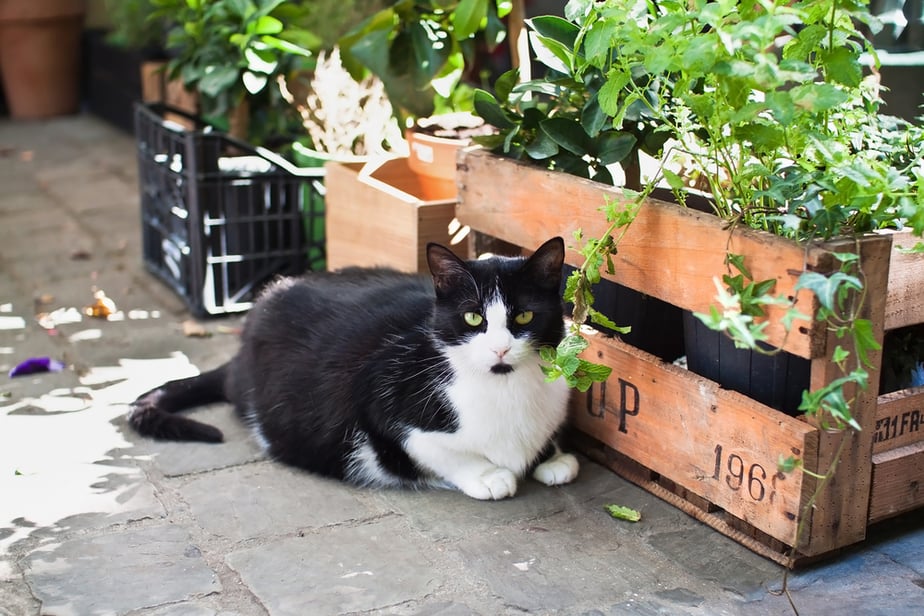
Who counts calories? Not me, that’s for sure. But, you might want to keep track to maintain your pet’s health. Felines need a certain amount of calories, but any excess spells trouble.
Do you ever eat high-calorie foods filled with carbs and later on you wonder where all the extra pounds came from? It most likely happens around the holiday season, right? Been there, done that!
However, your cat can’t keep track of these nutrients, so you might want to look out for her. While calories are a daily requirement for cats, carbs are not.
Your furkid doesn’t need carbohydrates in her diet because they come from – you guessed it – plant material. Due to carbs being derived from plants, they can’t be digested properly. This leads us to the conclusion that they are indeed unnecessary.
Overconsumption of carbs may lead to obesity, diabetes, and even tooth decay. Brussels sprouts are high in calories, but it’s not like you’ll feed them to your pet every day.
However, you want your cat to stay lean and maintain a healthy weight for many reasons. Health is the number one priority as always.
3. Protein and fat, what’s good for your cat?
These greens don’t have any fat whatsoever. However, they have a small amount of protein, which is good news. These nutrients are essential for a cat to stay healthy and some are even crucial.
Fat is a nutrient that’s required on a daily basis. It fuels your pet’s body and provides her with energy. It’s one of the most important sources of energy besides protein. However, too much of it could cause trouble.
Felines that eat high-fat foods are prone to becoming obese. This could cause problems to her joints, especially if she started gaining weight in her golden years. A disaster called arthritis is just waiting to happen.
Brussels sprouts have zero fat, which is good if you or your pet are trying to lose some weight. However, if your pet’s already underweight, you might want to skip these as a weekly treat. Cats need unsaturated, healthy fats to maintain health.
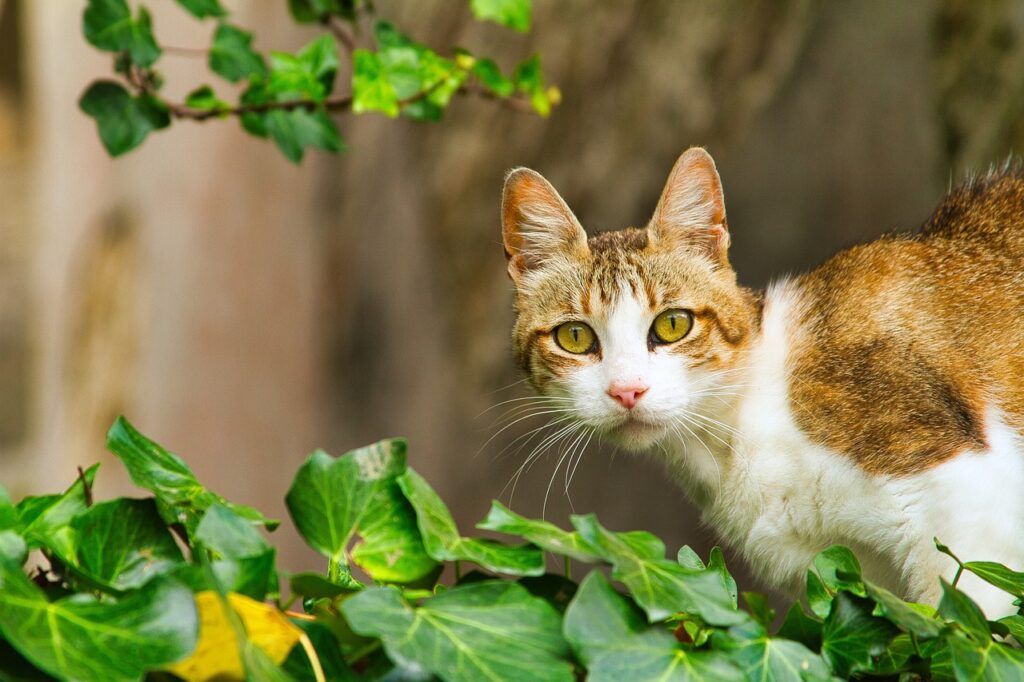
Can cats benefit from eating Brussels sprouts?
When it comes to protein, it’s a crucial part of a cat’s diet. They rely solely on protein intake because it serves their health in many ways. These tiny veggies have some protein, but is it enough?
Can cats eat Brussels sprouts and benefit from this veg’s protein content? This is a good question because remember, felines are carnivores. When we talk about protein, you think meat. But what about protein in veggies?
Protein found in vegetables like Brussels sprouts or asparagus is a good addition to your cat’s diet. However, the catch is that it comes from greens. I know what you’re thinking: What’s the difference?
The main point is that cats are wired to ingest meat, which means they have a harder time digesting plant material. Their bodies are built to break down animal protein, not plant matter.
This doesn’t mean cats shouldn’t eat veggies, but they are more likely to experience some gastrointestinal issues consuming veggies than meat.
The nutrients found in vegetables like Brussels sprouts may go to waste. Therefore, you may want to offer veggies like bell peppers as an occasional treat.
Can cats eat raw Brussels sprouts?
Although these veggies have multiple health benefits, it’s not a good idea to feed your kitty raw Brussels sprouts. When you think about it, would you ever eat raw sprouts?
It may be a different case scenario for canines, but felines are a different scenario altogether. Cats are picky eaters – and the fact that we’ve spoiled them rotten doesn’t help.
Besides, raw sprouts won’t tickle their fancy in the slightest. In their raw form, these veggies are hard to chew and digest. Not to mention how they won’t entice her olfactory sense!
Raw foods are always a risk, and not just to cats, but to you too. These veggies can be full of pesticides that are harmful to both of you. Insects and pathogens aren’t ruled out either.
Sprouts are usually grown in a humid climate and in the fall time. This is a prime environment for bacteria. Bacteria grow best in warm and humid temperatures, so it’s really best to avoid raw sprouts.
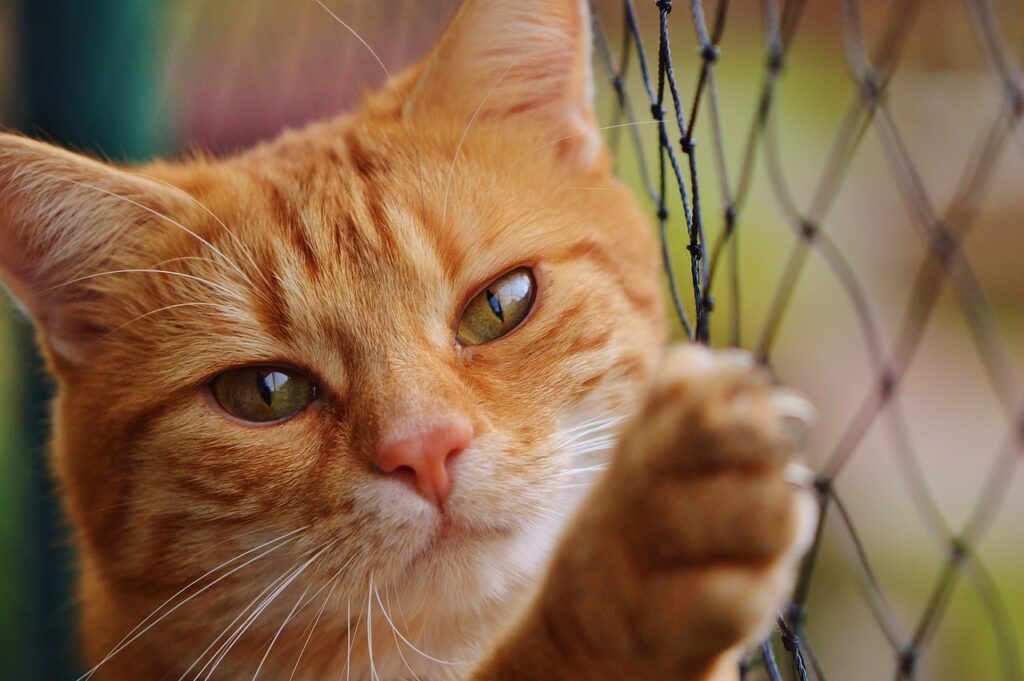
Can cats eat cooked Brussels sprouts?
Yes, cats can eat cooked Brussels sprouts and it’s maybe the only way they can eat them. We know that raw sprouts might be a threat to your cat’s health, but what about cooked ones?
Cooking Brussels sprouts is a great way of getting rid of any potential pathogens lingering in these veggies. And in the process of cooking, some vitamins’ and minerals’ properties are enhanced.
Besides, it’s way easier for your cat to chew on soft and small pieces of sprouts rather than try to break down that hard texture of raw sprouts. Cooked Brussels sprouts will be easier for her digestive system to break down the plant matter.
Cooked veggies are softer to chew on and therefore, your pet’s chances of choking on them are smaller. Chop them up into bite-sized pieces so your furkid won’t have a hard time swallowing them.
It’s important to mention that no seasonings or spices are allowed when cooking food for your furry friend. These can give her a stomach upset and, in some cases, lead to serious conditions like sodium poisoning.
Some spices like black pepper are okay to consume in moderation, but you should rather steer clear of any additional ingredients. You could grill sprouts, but that means adding oil – and while oil isn’t toxic for cats, it isn’t healthy either.
How to prepare Brussels sprouts for your cat?
These veggies don’t require any special treatment or preparation, but you have to be more careful if you’re preparing them for your kitto. You have to wash them carefully so you get rid of any dirt or other stuff that can be found.
The next thing you want to do is cut off the bottom of the sprout because it has a hard texture even when cooked. When it comes to cutting, chop up sprouts in small, bite-sized pieces so your cat won’t have a hard time chewing down on them. That way, you’re reducing the risk of your pet choking!
Also, it’s best if you cook Brussels sprouts without any additional spices and seasonings that could harm your pet. Rather keep them nicely stewed, plain, and chopped up! You could also mix it in with other cat-safe foods to make it more palatable.
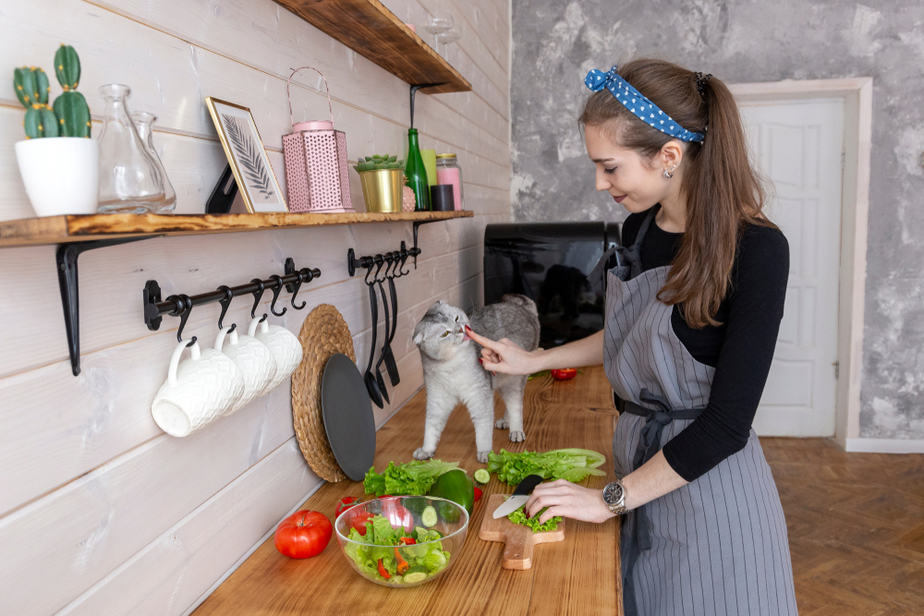
What if my cat eats too much?
If you were to ask your pet, she would probably say that it’s never too much food! We’re all quite familiar with that persistent meow at the crack of dawn. Who would have thought that such small creatures could fit so much food in their bellies?
Overeating doesn’t seem to be an issue for many cats. They will shake it off as if they hadn’t just eaten a full bowl and at those times they seem superior to humans, right?
But what happens if your pet eats too many Brussels sprouts?
Well, nothing serious is likely to happen, but your cat may experience some gastrointestinal issues. Vomiting, diarrhea, as well as bloating can all occur if your pet goes to town on this brassica.
Because they’re plants, Brussels sprouts may not be digested properly and therefore cause constipation in cats. To deal with this kind of problem, provide your feline with high-fiber foods to help her digestion.
However, this is very unlikely to happen because of the aforementioned reasons. Your cat is attracted to the scent of meat like, for instance, teriyaki beef jerky. Maybe try mixing some sprouts with her wet food and see her reaction.
Can cats eat Brussels sprout pâté?
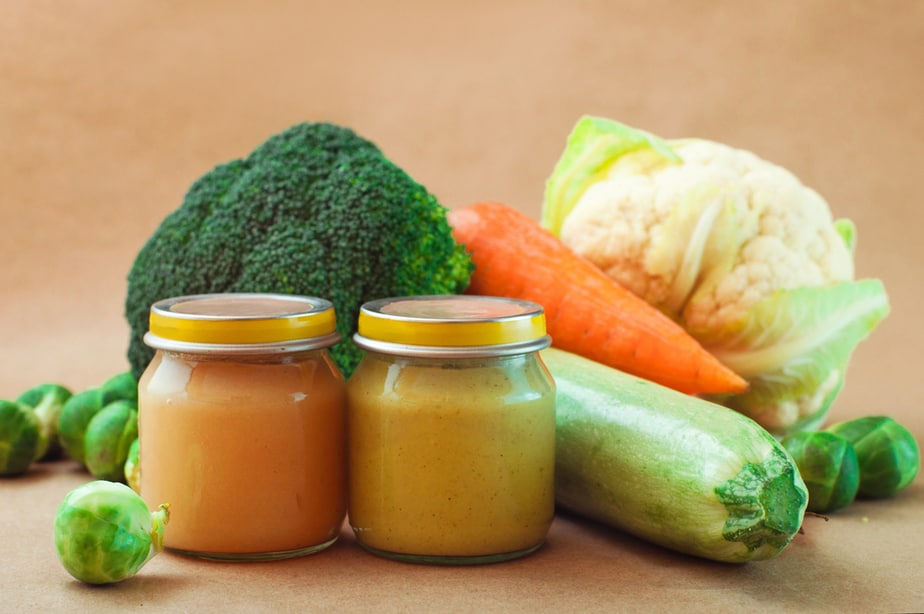
There are many ways that we as humans prepare these veggies, but one of the most appealing might be Brussels sprout pâté. This blended mix of veggies and spices is easy and quick to make, not to mention healthy!
However, this dish should be left out of your cat’s bowl. This beautiful blend won’t do magic to your cat’s tummy. Brussels sprout pâté contains ingredients that are harmful to your pet, such as garlic, black pepper, salt, and cream cheese.
Especially toxic to felines are garlic and salt. Garlic (and other members of the Allium family) is highly poisonous to felines because it destroys their red blood cells, which leads to anemia. Salt can also be toxic if consumed in excessive amounts.
The signs of garlic or sodium toxicity range from mild to severe, such as vomiting, diarrhea, dizziness, tremors, seizures, and coma. Therefore, it’s best to refrain from feeding your pet foods that contain these ingredients.
Cream cheese isn’t as harmful, but it is a dairy product. Surprisingly, cats are in fact lactose intolerant, but they may be attracted to the fat content. Just like sour cream, cream cheese is relatively harmless in small amounts.
What about frozen sprouts?
The short answer is yes, cats can eat frozen Brussels sprouts. Low temperatures, just as high temperatures can kill off any bacteria and germs found in veggies.
Cooking the sprouts gets rid of any potential pathogens and helps release vitamins and minerals. Freezing veggies has a similar effect because bacteria and germs can’t survive in cold temperatures.
Don’t feed your pet frozen sprouts from the bag though. This may sound like a good treat in the summer to keep them hydrated, but it’s best to check the sprouts before feeding them to your cat.
Drawbacks of cats eating Brussels sprouts
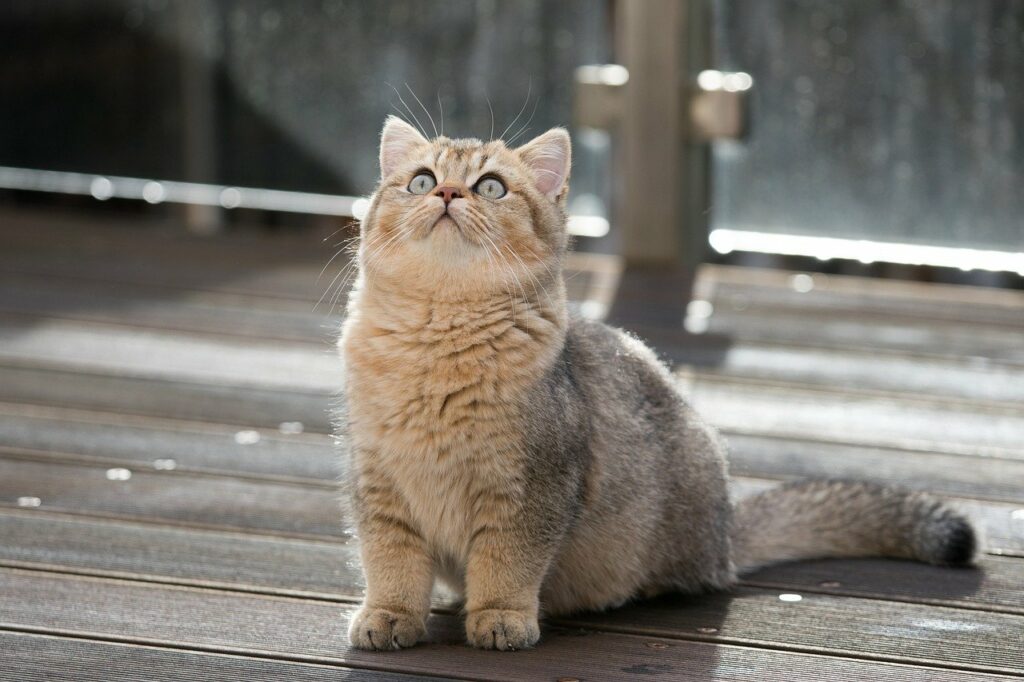
The good comes with the bad, and vice versa. Even though sprouts are considered a healthy food, there may be some downsides when it comes to sharing them with your cat.
Felines have a small build, but a big appetite! If your cat falls in love with these greens, she may just try to gulp them down.
This is a reason for concern because raw Brussels sprouts can easily get stuck in her throat. Cooking them makes their texture softer and reduces the risk of choking. Raw and frozen sprouts can also get stuck in between their teeth, which could make your cat freak out!
As with other cole crops, Brussels sprouts could lead to bloating in felines, resulting in – you know it – gas. We know how vile those stinkbombs can be, so be frugal when portioning out these sprouts for your pet.
Apart from bloating, your cat may develop some gastrointestinal issues due to sprouts being a plant material. It’s harder for felines to digest plant matter and therefore, she may experience some vomiting and diarrhea.
Can cats have an allergic reaction to sprouts?
Humans are known to have various allergies and, lo and behold, an allergy to Brussels sprouts is a thing. Cats are no different and although it’s rare, it’s still possible for your pet to have an allergic reaction to this vegetable.
Some more common foods that pets are allergic to are dairy, chicken, as well as grains. An allergic reaction could be recognized through many symptoms such as sneezing, wheezing, skin rashes, and itchiness.
Some other, more severe symptoms could be the swelling of the throat and mouth, respiratory problems, as well as choking. To eliminate the risk of your pet having an allergic reaction, introduce new foods slowly and closely monitor her behavior.
Food allergies are tricky because cats will grab the opportunity when they see something they like. These stealthy, curious creatures will eat anything that looks and smells tasty.
Felines can be born with a food allergy or they can develop it later in life. Similarly, they can also be stuck with it for the rest of their life or they can somehow outgrow it. Regardless, talk to your vet right away if you notice any signs of an allergy.
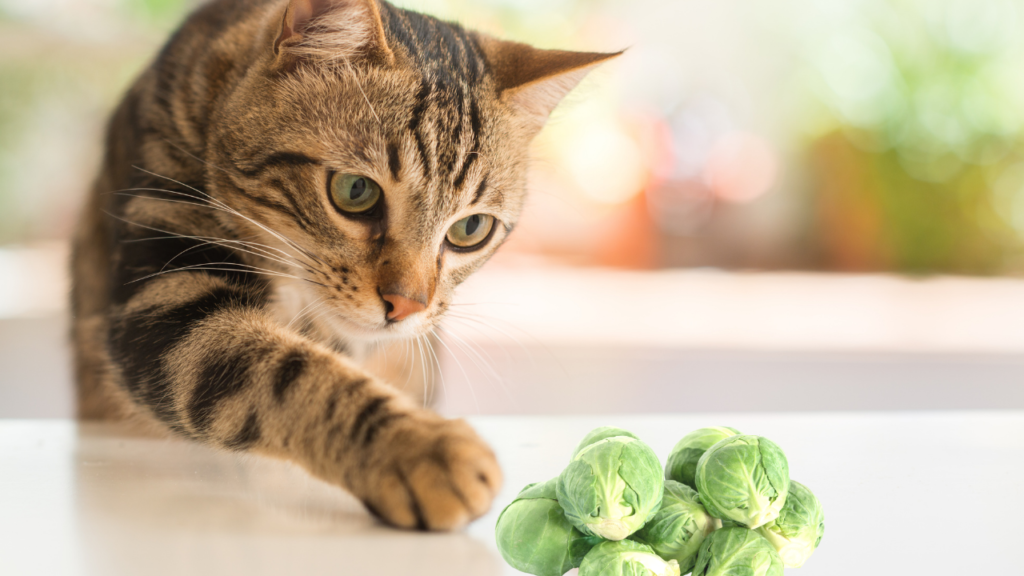
To conclude
Out of all the veggies out there, can cats eat Brussels sprouts? We’re more than happy to tell you that it’s perfectly safe for your pet to indulge in these greens. They’re abundant in vitamins and minerals that help to keep your cat’s health in check.
The good news is that sprouts have a certain amount of protein and although it’s plant material, it comes in handy as an occasional treat. Cats can eat Brussels sprouts, but in moderation, because they’re high in carbs and calories, which could be troublesome if they eat too much too often.
Remember to always feed your furkid cooked Brussels sprouts as it gets rid of any potential bacteria and germs. Also, cooked sprouts are softer and therefore easier for your pet to chew on and digest. Make sure to chop these veggies up into bite-sized pieces to prevent the possibility of choking.
Read more: Can Cats Eat Cauliflower? Does This Veggie Have Magic Powers?
